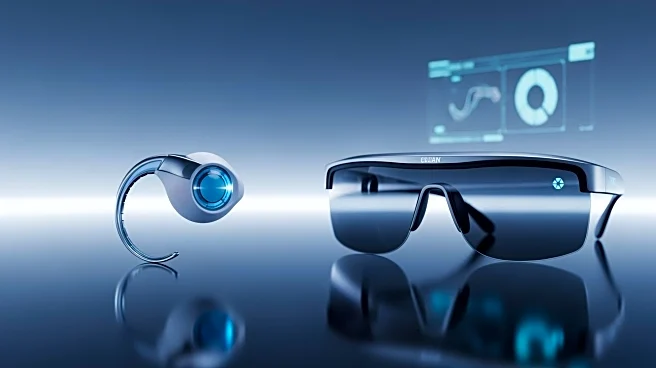What's Happening?
Researchers from University College London and Moorfields Eye Hospital have announced promising results from a trial involving a new device designed to help blind individuals regain their ability to read. The Prima device, developed by Science Corporation,
is a wireless subretinal photovoltaic implant that works in conjunction with augmented-reality glasses. The implant, resembling a SIM card, is inserted under the retina during a vitrectomy procedure. Once the eye has healed, the device is activated using AR glasses equipped with a video camera and a small computer. Artificial intelligence algorithms process visual information, converting it into electrical signals that the brain interprets as vision. In a recent trial, 84% of participants, who had lost their sight due to geographic atrophy with dry age-related macular degeneration, were able to read letters, numbers, and words using prosthetic vision.
Why It's Important?
This development is significant as it offers a potential solution for individuals suffering from geographic atrophy with dry age-related macular degeneration, a condition currently without treatment. Affecting approximately 5 million people globally, this condition leads to irreversible central vision loss. The Prima device represents a breakthrough in neural engineering and brain-computer interfaces, potentially transforming the lives of those affected by this condition. By restoring the ability to read, the device could enhance the independence and quality of life for many individuals, reducing reliance on caregivers and assistive technologies.
What's Next?
Following the successful trial, the Prima device is on a clearer path towards market approval. The next steps likely involve further clinical trials to validate the device's efficacy and safety on a larger scale. Regulatory approval processes will be crucial in determining the timeline for commercial availability. Stakeholders, including healthcare providers and patients, will be closely monitoring developments, as the device promises to address a significant unmet medical need. Additionally, the technology could spur further innovations in the field of neural engineering and prosthetic vision.
Beyond the Headlines
The ethical implications of such technology are profound, as it raises questions about accessibility and affordability for patients worldwide. The integration of AI in medical devices also prompts discussions on data privacy and the need for robust cybersecurity measures. Long-term, this advancement could lead to broader applications of brain-computer interfaces, potentially revolutionizing treatment for various neurological conditions.
















